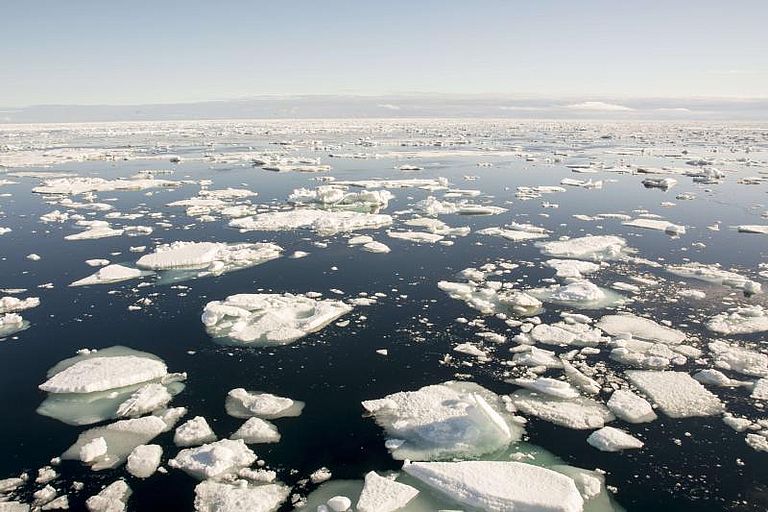UK and Germany join forces to fund crucial Arctic science
GEOMAR coordinates new projects on traces gases and microorganisms in the Arctic Ocean
03 July 2018/ London, Berlin, Kiel. The UK’s Natural Environment Research Council (NERC) and Germany’s Federal Ministry of Education and Research (BMBF) have jointly invested almost 9 million euro in 12 new projects to carry out crucial research in one of the most inhospitable regions on the planet. The new projects start today and add to the existing NERC Changing Arctic Ocean research programme, which aims to better understand – and predict – changes of the Arctic marine environment and ecosystems.
Climate change is having obvious and severe impacts in the Polar Regions. The Arctic is currently warming at more than double the rate of other parts of the ocean, causing unprecedented change to the region’s ocean environment. The Arctic Ocean’s ecosystem is especially sensitive to warming because of its reliance on sea ice, from the algae that grow on its underside to polar bears that hunt and live on its surface. Any reduction in sea ice habitat will affect the entire food chain, including some of the most productive commercial fishing grounds in the world. Scientists don’t yet understand how these impacts are going to unfold. They need more data and improved computer models to predict the consequences. With cutting-edge science from 32 UK and German research institutes, the NERC Changing Arctic Ocean programme is helping to address these challenges.
UK Science Minister Sam Gyimah said: “I am proud the UK is leading the way in tackling harmful climate change and today’s announcement means world-class researchers from both the UK and Germany will now be doing vitally important work to understand changes to marine life in the Arctic Ocean."
Federal Research Minister Anja Karliczek emphasizes the particular importance of international cooperation in Arctic research: “What is happening in the Arctic strongly impacts global climate and therefore also us in Europe. We need research on the fast and profound changes occurring in the Arctic climate because these changes affect us all. That is why we are launching this important Arctic research collaboration with the
The 12 research projects span many of the effects of warming on the Arctic Ocean’s ecosystem. The GEOMAR Helmholtz Centre for Ocean Research Kiel coordinates two of these projects.
The project PETRA (Pathways and Emissions of Climate-Relevant Trace Gases in a Changing Arctic Ocean) aims to expand knowledge about climate-relevant trace gases in the Arctic Ocean. These include, for example, nitrous oxide, methane, dimethyl sulphide and carbon monoxide. They are credited with a great potential to influence the climate of the Arctic. However, the quantities of these gases produced in the Arctic as well as the places for the production are still unknown. German coordinator of the project is Prof. Dr. Hermann Bange from GEOMAR, on the British side Professor Andy Rees (Plymouth Marine Laboratory) coordinates the project. Starting on 10 July, three scientists from the GEOMAR and three from the Plymouth Marine Laboratory will participate in cruise PS114 of the research icebreaker POLARSTERN to the Fram Strait in order to collect first data and samples.
The project Micro-ARC (Understanding the left between pelagic microbial ecosystems and organic matter cycling in the changing Arctic) addresses the question of whether and how microorganisms living in the sunlit upper layers of the Arctic Ocean can adapt to climate change. This question is fundamental for the development of the region because these microorganisms form the basis of the food web. The Micro-ARC team is multidisciplinary and has expertise in marine microbial ecology, biogeochemistry, polar plankton ecology, and ecosystem modelling. New findings and samples will also be obtained during the POLARSTERN expedition PS114. In addition, researchers of the project will participate in the International Arctic Drift Expedition MOSAiC, for which the POLARSTERN will freeze into the ice from autumn 2019 and drift through the Arctic for a year. On the German side Prof. Dr. Anja Engel (GEOMAR) coordinates the project, British coordinator is Dr. Michael Cunliffe (Marine Biological Association / University of Plymouth).
The detailed press release of the Natural Environment Research Council (NERC) on the start of all twelve projects can be found here.



